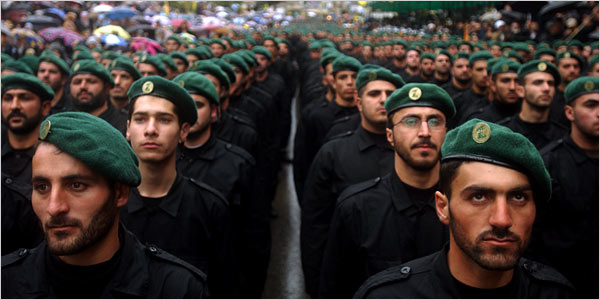
From Karen DeYoung and Joby Warrick, Washington Post: Iran and Hezbollah, its Lebanese proxy, are building a network of militias inside Syria to preserve and protect their interests in the event that President Bashar al-Assad’s government falls or is forced to retreat from Damascus, according to U.S. and Middle Eastern officials.
The militias are fighting alongside Syrian government forces to keep Assad in power. But officials think Iran’s long-term goal is to have reliable operatives in Syria in case the country fractures into ethnic and sectarian enclaves.
A senior Obama administration official cited Iranian claims that Tehran was backing as many as 50,000 militiamen in Syria. “It’s a big operation,” the official said. “The immediate intention seems to be to support the Syrian regime. But it’s important for Iran to have a force in Syria that is reliable and can be counted on.”
Iran’s strategy, a senior Arab official agreed, has two tracks. “One is to support Assad to the hilt, the other is to set the stage for major mischief if he collapses. . . .”
Tehran’s interest in preserving a Syrian base partly explains why the financially strapped Iranian government continues to lavish resources on groups such as Jaysh al-Sha’bi, an alliance of local Shiite and Alawite militias that receives weapons and cash from Iran, according to U.S. and Middle Eastern officials who have studied the organization. The groups are receiving military training from officers from Hezbollah and Iran’s Islamic Revolutionary Guard Corps (IRGC).
While ostensibly created to bolster Syria’s battered, overstretched army, Jaysh fighters — separate from Syria’s pro-regime shabiha, or “ghost,” units, which are notorious for reprisal killings of suspected rebel sympathizers — are predominantly a sectarian fighting force overseen by Iranian and Hezbollah commanders.
“Jaysh is essentially an Iran-Hezbollah joint venture,” said David Cohen, undersecretary for terrorism and financial intelligence at the Treasury Department. “Given the other constraints on Iranian resources right now, it’s obvious that this is an important proxy group for them. . . .”
Newly installed Secretary of State John F. Kerry expressed during his confirmation hearing last month the administration’s concern that Syria could break apart, saying that “one of the scenarios everybody’s talking about is that people could sort of break up off into their places . . . and you could have a disintegration, and who knows where that leads?”
“These are the risks,” Kerry said. “I mean, this is what is at stake in this new world that we’re dealing with. And nobody could sit here and tell you how it all plays out.” (photo: James Hill/New York Times)
Image: nyt%202%2011%2013%20Hezbollah.jpg
